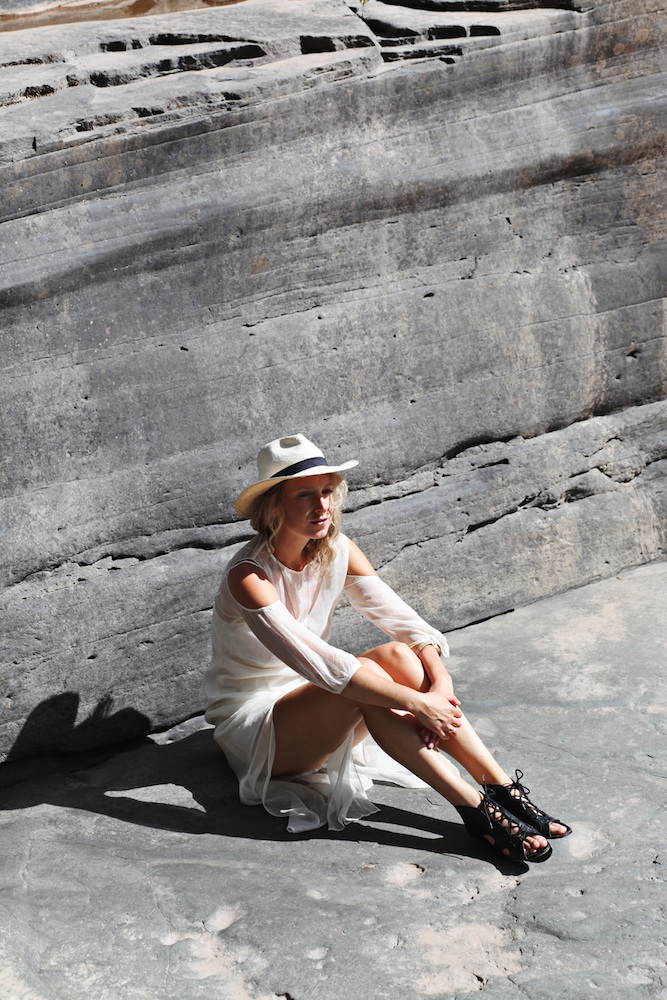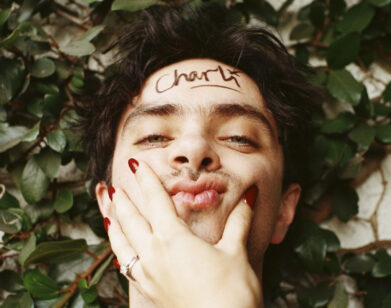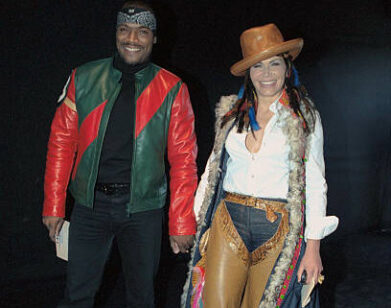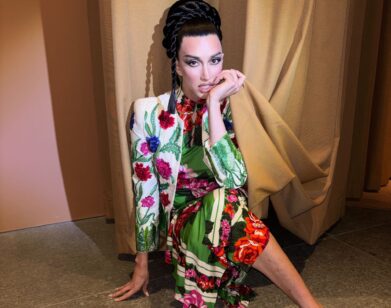On the Precipice of Adulthood

ABOVE: ANNIE DEWITT. PHOTO COURTESY OF JEROME JAKUBIEC.
Out tomorrow, August 9, via Tyrant Books, Annie DeWitt’s debut novel White Nights in Split Town City is wild, often violent, and jarringly beautiful. Set in a rural New England town in the summer of 1990, the book’s narrator Jean is a 13-year-old aching to understand and partake in the complex adult world around her.
Surrounded by horses, parents with secrets, and a sneaking awareness of the dangerous outside world, Jean’s voice is at once twisted, sweet, and harsh as she attempts to make sense of what she sees. There is the Desert Storm raging on television, the start of the internet, her parent’s crumbling marriage, and her own raging, out of control body and sudden desires.
DeWitt has written a dark, compulsive capsule of lost youth. Her language reflects the turgid, shifting landscape both inside Jean and in the dirt country roads, open skies, and enticing and menacing nature she grows up in.
We met the writer and professor at a downtown wine bar during a summer thunderstorm. Topics discussed include isolation, what the middle of nowhere is, fetishizing adult lives, subversive sexuality, and the violence of coming of age.
ROYAL YOUNG: I want to talk about living in relative isolation and how that shapes people.
ANNIE DEWITT: That was a huge impetus for wanting to write the book because I feel like people equate stories about small rural towns with a lot of the Southern writers that I love like Flannery O’Connor. People feel like those kinds of places only exist in America in the South or Southwest. There’s something in me that’s always laughed at that. There are small towns everywhere in America, like Maine, New Hampshire, Massachusetts where I grew up. I grew up until I was in seventh grade, so Jean’s age, on a dead end dirt road. I identified completely with that place and I still do.
YOUNG: Why? What about it?
DEWITT: When I was that age, there was a part of me that was really introverted. I felt like being in a place where you could identify with the landscape almost like a person really spoke to me. My dad had a 17-hand horse named Rebel and we had a barn in the backyard. On weekends, we would take the horses out and gallop around cornfields. To me that was normal.
YOUNG: When do you feel like you outgrew that? Because I feel like there’s a lot of longing in the book. In your life, did you ever long for something larger?
DEWITT: Yes. I think I am both my parents’ child. My mom came from a working class Ukrainian background and she loves the city. She grew up going to Russian speaking ceremonies. My dad grew up in upstate New York. The book is situated for me between those two worlds, which is the desire of the mother to be in a city. I lived in New York for 10 years. I love the aspect of a cosmopolitan life, which is full of non-homogeneous people and its own form of dialect and controversy. But I think my soul is a landscape that’s reflected by being in the middle of nowhere.
YOUNG: I think it’s interesting to say the middle of nowhere because it’s not nowhere. It’s somewhere. It’s a world unto itself.
DEWITT: Totally. Nowhere is such a great and weird word, right? Because it kind of denotes those places as having no intellectual or cultural relevance.
YOUNG: Or cell service.
DEWITT: [laughs] Yes. It’s not silent there but it’s a different kind of noise. You go and stand out on my lawn at two in the morning and there’s owls speaking to each other, there’s young foxes playing, there’s coyotes screaming. To me, that’s where I hear my own voice.
YOUNG: I want to talk to you about imagining adult lives before you quite know what the realities of them are.
DEWITT: And fetishizing adult lives. I mean what do you want to be at 13 except a sexy adult version of yourself whose body is under control? Who’s not outside of all the weird adult conversations that are happening. I was a kid who was always friends with adults.
YOUNG: How was that?
DEWITT: It was great. I didn’t think of them any differently.
YOUNG: What’s interesting is, I would imagine there were boundaries you weren’t aware of.
DEWITT: Definitely. I had an uncle at that age who would have been about our age now. He was unmarried and visited us on weekends. He was one of me and my sister’s closest friends. But being unaware of it at the time he had this whole adult life, like he would bring us card shufflers because he spent a lot of time gambling in Vegas. My sister and I could play Spit like the best of them. He was the first person who gave me a Joni Mitchell CD. My parents always treated us emotionally and intellectually as adults, which had its ups and downs.
YOUNG: Oh, my parents too. But there’s a difference between giving you adult things and exposing a child to the responsibilities or pain of adulthood. Adulthood can seem like an amazing, exotic world to a child until you unearth some of the rotten shit that happens.
DEWITT: Yeah, and for Jean’s situation in the book specifically that happens with Otto. For a kid who feels like they’re an adult, what they don’t realize is that the adults know they’re a child. The thing I really wanted to play with in the scene between them is, is Otto innocent for the things he’s done? Is he guilty? It was really important for me to not come down on one side of that line.
YOUNG: Subversive sexuality plays a part in the book.
DEWITT: Definitely. Tell me about the word subversive.
YOUNG: A lot of the sex in the book felt not necessarily tender. There was an undercurrent of violence, which I relate to—any kind of initiation into anything comes as a shock. There’s a level of pain there.
DEWITT: Totally. I wanted that to be there. When Jean hears her parents have sex she feels like her mom sounds like an animal bringing back her kill or something. That is mirrored in the mom’s interest in violence. She watches the news constantly. The Gulf War is starting. I think kids are attracted to violence, they want to explore everything and nothing is taboo.
YOUNG: Do you think we live in a violent world?
DEWITT: Absolutely. I mean just this summer has been so bloody.
YOUNG: The book takes place in the ’90s. The technology has changed so much.
DEWITT: That was why it was so important for me to set the book then, the last summer before the Internet exploded. Your soul’s location on the earth was tracked by how far you could ride on your bike, not a GPS signal. As a country, I don’t think we realize how much that was a huge loss of innocence. We’re still not awake.
WHITE NIGHTS IN SPLIT TOWN CITY COMES OUT TOMORROW, AUGUST 9, 2016.






